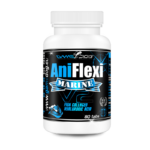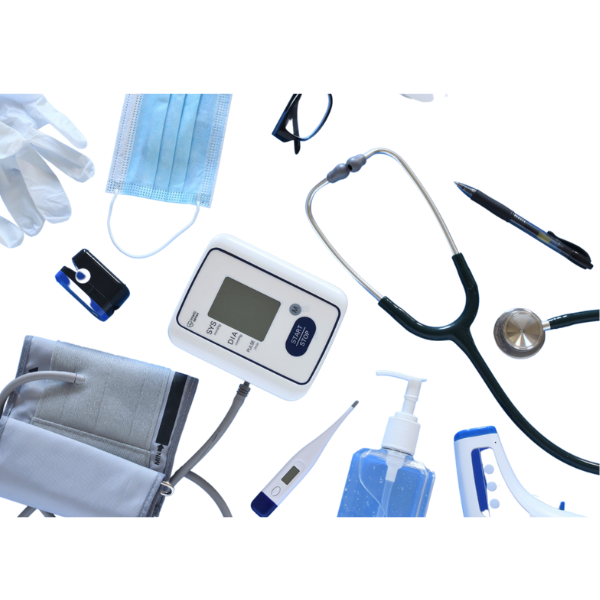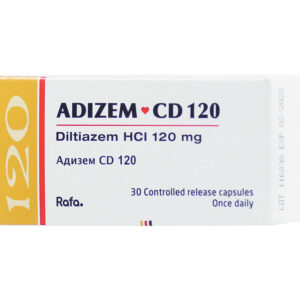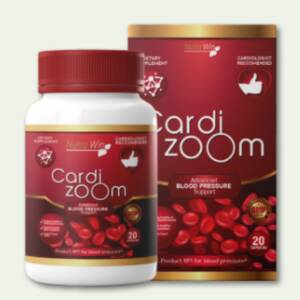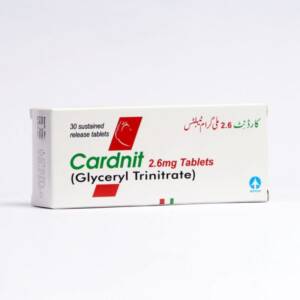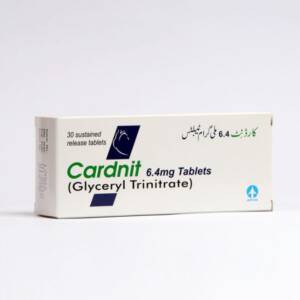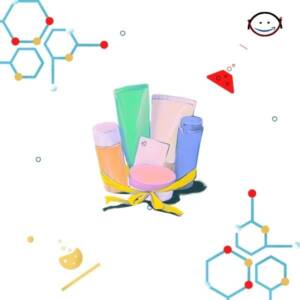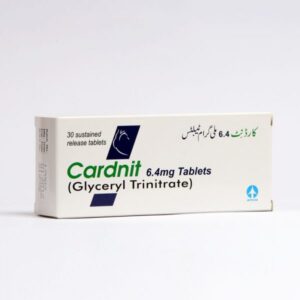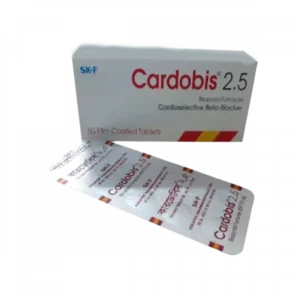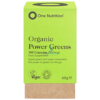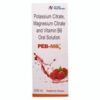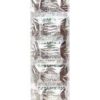-
Sooft Italia Gangliomix Food Supplement 30 Tablets ₦55,898.00 QTY: 1
-
One Nutrition Organic Powergreens 500mg Vegecaps - 100 ₦23,300.00 QTY: 1
-
PEB MB6 RASPBERRY FLAVOUR SOLUTION 200ML ₦3,485.75 QTY: 1
-
GABAPIN 400MG CAPSULE ₦6,105.00 QTY: 1
Customer matched zone "Lagos Delivery Options"
Sort by:
61409–61424 of 362918 Results
-
Cardizem CD Drugs 0 The AllschoolabsStars rating goes beyond a simple average of reviews. It?s calculated based on various factors, including the quantity, recency, and reliability of the reviews. Read More Search for medical details concerning Cardizem CD oral on Allschoolabs including its side effects, uses, precautions, overdose, interactions, warnings and user reviews. Ask a Question Write a reviewSku: 1742125455-461
Cardizem CD
₦0.00 -
-
SaleCardizem-SR 120 mgCardizem-SR 120 mg film-coated tablet is used for the prophylaxis and treatment of chronic stable (classical) and vasopastic angina pectoris and has also been used alone or in combination in the management of hypertension, also, Diltiazem is effective in myocardial infarction, coronary artery spasm ... Read moreCardizem-SR 120 mg film-coated tablet is used for the prophylaxis and treatment of chronic stable (classical) and vasopastic angina pectoris and has also been used alone or in combination in the management of hypertension, also, Diltiazem is effective in myocardial infarction, coronary artery spasm, arrhythmias, Raynaud's phenomenon, oesophageal motility disorder and migraine.Cardizem-SR 120 mg sustained release tablet is indicated in the prophylaxis and treatment of angina pectoris. It is used in the management of classical and vasospastic angina pectoris. It has also been used in the treatment of essential hypertension. It is used for prophylaxis of some selected supraventricular tachyarrhythmias.Theropeutic ClassCalcium-channel blockersPharmacologyDiltiazem hydrochloride is a calcium channel antagonist. It is a peripheral and coronary vasodilator with some negative inotropic activity. Diltiazem inhibits cardiac conduction particularly at the sino-atrial and atrioventricular nodes. Diltiazem?has the following actions:Antianginal: A direct dilatation of coronary arteries and arterioles proved oxygen supply to myocardial tissues. In addition dilatation of the peripheral vasculature reduces systemic pressure of cardiac "after load" which results in lessened stress and reduced oxygen requirements of the myocardial tissues.Antiarrhythmic: The inhibited influx of calcium ions in cardiac tissues result in slowed electrophysiological activity through the S-A and A-V nodes without affecting accessory bypass conduction or altering normal atrial action potential or intraventricular conduction.Antihypertensive: Reduces peripheral vascular resistance as a result of vasodilatation.Dosage & Administration of Cardizem-SR 120 mgHypertension: Dosage needs to be adjusted by titration to individual patient needs. When used as monotherapy, usual starting doses are 120 to 240 mg once daily. Maximum antihypertensive effect is usually observed by 14 days of chronic therapy; therefore, dosage adjustments should be scheduled accordingly. The usual dosage range studied in clinical trials was 120 to 540 mg once daily. Current clinical experience with 540 mg dose is limited; however, the dose may be increased to 540 mg once daily.Angina: Dosages for the treatment of angina should be adjusted to each patient's needs, starting with a dose of 120 mg to 180 mg once daily. Individual patients may respond to higher doses of up to 540 mg once daily. When necessary, titration should be carried out over 7 to 14 days.Dosage of Cardizem-SR 120 mgFilm-coated formulation: The usual dose of Cardizem-SR 120 mg film coated tablet is 60 mg thrice daily. However patient's response may vary and dosage requirements can differ significantly between individual patients. If necessary, the divided dose may be increased to 180-300 mg/day. Dosage may be started as 30 mg four times daily and increasing at 1 to 2 days intervals until the optimum response is achieved. Higher doses upto 480 mg/day have been used with benefit in some patients especially in unstable angina. Elderly and patients with impaired hepatic or renal function: The recommended starting dose is 60 mg twice daily. The heart rate should be measured regularly and the dose should not be increased if the heart rate falls below 50 beats per minute.Sustained release formulation: Mild to moderate hypertension: initially 90 mg or 120 mg twice daily (elderly once daily); up to 360 mg daily may be required (elderly upto 240 mg) daily. Angina: initially 90 mg or 120 mg twice daily in divided doses may be required (elderly up to 240 mg daily). Interaction of Cardizem-SR 120 mgConcomitant prophylactic therapy with short-or long-acting nitrates may be administered safely during diltiazem therapy. Diltiazem recommended caution and careful dosage titration when diltiazem is administered concomitantly with other drugs that can affect cardiac contractility and/ or conduction.ContraindicationsCardizem-SR 120 mg sustained release tablet is contraindicated in patients with known hypersensitivity to the drug, sick sinus syndrome, second or third degree AV block, severe hypertension or acute myocardial infarction and rediographically documented pulmonary congestion.Side Effects of Cardizem-SR 120 mgBradycardia, sino-atrial block, atrioventricular block, hypertension, malaise, headache, hot flushes, GIT disturbances, oedema, hepatitis and depression reported.Pregnancy & LactationPregnancy: There are no adequate and controlled studies to date with diltiazem in pregnant women, and the drug should be used during pregnancy only when the potential benefits justify the possible risk to the fetus.Lactation: Because diltiazem is distributed into milk, women receiving the drug should not breastfeed their infants; an alternative method of infant feeding should be used if diltiazem therapy is considered necessary in nursing women.Precautions & WarningsPatients with mild bradycardia or a prolonged PR interval should be observed closely. Diltiazem?does not have a significant myocardial depressant effect and is well tolerated in patients with poor left ventricular function. The drug should be used with caution in patients with impaired hepatic or renal function.Overdose Effects of Cardizem-SR 120 mgSymptoms: Hypotension, bradycardia, heart block, heart failure, impaired conduction, ECG changes, arrhythmias, shock, altered mental status, cardiac arrest. Management: Symptomatic and supportive treatment. Gastric lavage and admin of activated charcoal may be initiated. Maintain appropriate ventilation. Charcoal hemoperfusion may be useful. Hypotension may be treated with fluids and vasopressor agents. Bradycardia, 2nd- or 3rd-degree AV block may be treated with IV atropine sulfate.Storage ConditionsKeep medicine out of the reach of children. Store in a cool and dry place.Use In Special PopulationsElderly and patients with impaired hepatic or renal function: The recommended starting dose is 60 mg twice daily. The heart rate should be measured regularly in these groups of patients and the dose should not be increased if the heart rate falls below 50 beats per minute.Children: Not recommended.ReconstitutionDilute with appropriate solution either dextrose 5% in water, normal saline, dextrose 5% in water with NaCl 0.45% to achieve desired vol of concentration.Drug ClassesCalcium-channel blockersMode Of ActionDiltiazem hydrochloride is a calcium channel antagonist. It is a peripheral and coronary vasodilator with some negative inotropic activity. Diltiazem inhibits cardiac conduction particularly at the sino-atrial and atrioventricular nodes. Diltiazem has the following actions:Antianginal: A direct dilatation of coronary arteries and arterioles proved oxygen supply to myocardial tissues. In addition dilatation of the peripheral vasculature reduces systemic pressure of cardiac "after load" which results in lessened stress and reduced oxygen requirements of the myocardial tissues.Antiarrhythmic: The inhibited influx of calcium ions in cardiac tissues result in slowed electrophysiological activity through the S-A and A-V nodes without affecting accessory bypass conduction or altering normal atrial action potential or intraventricular conduction.Antihypertensive: Reduces peripheral vascular resistance as a result of vasodilatation. More than 90% of an oral dose is rapidly absorbed. Protein binding is very high. Peak plasma concentration reaches within 30-60 minutes. It is metabolised in the liver and excreted (60%) through bile.PregnancyThere are no adequate and controlled studies to date with diltiazem in pregnant women, and the drug should be used during pregnancy only when the potential benefits justify the possible risk to the fetus. Because diltiazem is distributed into milk, women receiving the drug should not breastfeed their infants; an alternative method of infant feeding should be used if diltiazem therapy is considered necessary in nursing women.Sku: 1736106408-4138
Cardizem-SR120 mg
₦4,400.00Original price was: ₦4,400.00.₦3,960.00Current price is: ₦3,960.00.₦4,400.00Original price was: ₦4,400.00.₦3,960.00Current price is: ₦3,960.00. Add to basket Quick View -
SaleCardizem-SR 90 mgCardizem-SR 90 mg film-coated tablet is used for the prophylaxis and treatment of chronic stable (classical) and vasopastic angina pectoris and has also been used alone or in combination in the management of hypertension, also, Diltiazem is effective in myocardial infarction, coronary artery spasm ... Read moreCardizem-SR 90 mg film-coated tablet is used for the prophylaxis and treatment of chronic stable (classical) and vasopastic angina pectoris and has also been used alone or in combination in the management of hypertension, also, Diltiazem is effective in myocardial infarction, coronary artery spasm, arrhythmias, Raynaud's phenomenon, oesophageal motility disorder and migraine.Cardizem-SR 90 mg sustained release tablet is indicated in the prophylaxis and treatment of angina pectoris. It is used in the management of classical and vasospastic angina pectoris. It has also been used in the treatment of essential hypertension. It is used for prophylaxis of some selected supraventricular tachyarrhythmias.Theropeutic ClassCalcium-channel blockersPharmacologyDiltiazem hydrochloride is a calcium channel antagonist. It is a peripheral and coronary vasodilator with some negative inotropic activity. Diltiazem inhibits cardiac conduction particularly at the sino-atrial and atrioventricular nodes. Diltiazem?has the following actions:Antianginal: A direct dilatation of coronary arteries and arterioles proved oxygen supply to myocardial tissues. In addition dilatation of the peripheral vasculature reduces systemic pressure of cardiac "after load" which results in lessened stress and reduced oxygen requirements of the myocardial tissues.Antiarrhythmic: The inhibited influx of calcium ions in cardiac tissues result in slowed electrophysiological activity through the S-A and A-V nodes without affecting accessory bypass conduction or altering normal atrial action potential or intraventricular conduction.Antihypertensive: Reduces peripheral vascular resistance as a result of vasodilatation.Dosage & Administration of Cardizem-SR 90 mgHypertension: Dosage needs to be adjusted by titration to individual patient needs. When used as monotherapy, usual starting doses are 120 to 240 mg once daily. Maximum antihypertensive effect is usually observed by 14 days of chronic therapy; therefore, dosage adjustments should be scheduled accordingly. The usual dosage range studied in clinical trials was 120 to 540 mg once daily. Current clinical experience with 540 mg dose is limited; however, the dose may be increased to 540 mg once daily.Angina: Dosages for the treatment of angina should be adjusted to each patient's needs, starting with a dose of 120 mg to 180 mg once daily. Individual patients may respond to higher doses of up to 540 mg once daily. When necessary, titration should be carried out over 7 to 14 days.Dosage of Cardizem-SR 90 mgFilm-coated formulation: The usual dose of Cardizem-SR 90 mg film coated tablet is 60 mg thrice daily. However patient's response may vary and dosage requirements can differ significantly between individual patients. If necessary, the divided dose may be increased to 180-300 mg/day. Dosage may be started as 30 mg four times daily and increasing at 1 to 2 days intervals until the optimum response is achieved. Higher doses upto 480 mg/day have been used with benefit in some patients especially in unstable angina. Elderly and patients with impaired hepatic or renal function: The recommended starting dose is 60 mg twice daily. The heart rate should be measured regularly and the dose should not be increased if the heart rate falls below 50 beats per minute.Sustained release formulation: Mild to moderate hypertension: initially 90 mg or 120 mg twice daily (elderly once daily); up to 360 mg daily may be required (elderly upto 240 mg) daily. Angina: initially 90 mg or 120 mg twice daily in divided doses may be required (elderly up to 240 mg daily). Interaction of Cardizem-SR 90 mgConcomitant prophylactic therapy with short-or long-acting nitrates may be administered safely during diltiazem therapy. Diltiazem recommended caution and careful dosage titration when diltiazem is administered concomitantly with other drugs that can affect cardiac contractility and/ or conduction.ContraindicationsCardizem-SR 90 mg sustained release tablet is contraindicated in patients with known hypersensitivity to the drug, sick sinus syndrome, second or third degree AV block, severe hypertension or acute myocardial infarction and rediographically documented pulmonary congestion.Side Effects of Cardizem-SR 90 mgBradycardia, sino-atrial block, atrioventricular block, hypertension, malaise, headache, hot flushes, GIT disturbances, oedema, hepatitis and depression reported.Pregnancy & LactationPregnancy: There are no adequate and controlled studies to date with diltiazem in pregnant women, and the drug should be used during pregnancy only when the potential benefits justify the possible risk to the fetus.Lactation: Because diltiazem is distributed into milk, women receiving the drug should not breastfeed their infants; an alternative method of infant feeding should be used if diltiazem therapy is considered necessary in nursing women.Precautions & WarningsPatients with mild bradycardia or a prolonged PR interval should be observed closely. Diltiazem?does not have a significant myocardial depressant effect and is well tolerated in patients with poor left ventricular function. The drug should be used with caution in patients with impaired hepatic or renal function.Overdose Effects of Cardizem-SR 90 mgSymptoms: Hypotension, bradycardia, heart block, heart failure, impaired conduction, ECG changes, arrhythmias, shock, altered mental status, cardiac arrest. Management: Symptomatic and supportive treatment. Gastric lavage and admin of activated charcoal may be initiated. Maintain appropriate ventilation. Charcoal hemoperfusion may be useful. Hypotension may be treated with fluids and vasopressor agents. Bradycardia, 2nd- or 3rd-degree AV block may be treated with IV atropine sulfate.Storage ConditionsKeep medicine out of the reach of children. Store in a cool and dry place.Use In Special PopulationsElderly and patients with impaired hepatic or renal function: The recommended starting dose is 60 mg twice daily. The heart rate should be measured regularly in these groups of patients and the dose should not be increased if the heart rate falls below 50 beats per minute.Children: Not recommended.ReconstitutionDilute with appropriate solution either dextrose 5% in water, normal saline, dextrose 5% in water with NaCl 0.45% to achieve desired vol of concentration.Drug ClassesCalcium-channel blockersMode Of ActionDiltiazem hydrochloride is a calcium channel antagonist. It is a peripheral and coronary vasodilator with some negative inotropic activity. Diltiazem inhibits cardiac conduction particularly at the sino-atrial and atrioventricular nodes. Diltiazem has the following actions:Antianginal: A direct dilatation of coronary arteries and arterioles proved oxygen supply to myocardial tissues. In addition dilatation of the peripheral vasculature reduces systemic pressure of cardiac "after load" which results in lessened stress and reduced oxygen requirements of the myocardial tissues.Antiarrhythmic: The inhibited influx of calcium ions in cardiac tissues result in slowed electrophysiological activity through the S-A and A-V nodes without affecting accessory bypass conduction or altering normal atrial action potential or intraventricular conduction.Antihypertensive: Reduces peripheral vascular resistance as a result of vasodilatation. More than 90% of an oral dose is rapidly absorbed. Protein binding is very high. Peak plasma concentration reaches within 30-60 minutes. It is metabolised in the liver and excreted (60%) through bile.PregnancyThere are no adequate and controlled studies to date with diltiazem in pregnant women, and the drug should be used during pregnancy only when the potential benefits justify the possible risk to the fetus. Because diltiazem is distributed into milk, women receiving the drug should not breastfeed their infants; an alternative method of infant feeding should be used if diltiazem therapy is considered necessary in nursing women.Sku: 1736107738-4539
Cardizem-SR90 mg
₦3,300.00Original price was: ₦3,300.00.₦2,970.00Current price is: ₦2,970.00.₦3,300.00Original price was: ₦3,300.00.₦2,970.00Current price is: ₦2,970.00. Add to basket Quick View -
SaleCardizem 30 mgCardizem 30 mg film-coated tablet is used for the prophylaxis and treatment of chronic stable (classical) and vasopastic angina pectoris and has also been used alone or in combination in the management of hypertension, also, Diltiazem is effective in myocardial infarction, coronary artery spasm ... Read moreCardizem 30 mg film-coated tablet is used for the prophylaxis and treatment of chronic stable (classical) and vasopastic angina pectoris and has also been used alone or in combination in the management of hypertension, also, Diltiazem is effective in myocardial infarction, coronary artery spasm, arrhythmias, Raynaud's phenomenon, oesophageal motility disorder and migraine.Cardizem 30 mg sustained release tablet is indicated in the prophylaxis and treatment of angina pectoris. It is used in the management of classical and vasospastic angina pectoris. It has also been used in the treatment of essential hypertension. It is used for prophylaxis of some selected supraventricular tachyarrhythmias.Theropeutic ClassCalcium-channel blockersPharmacologyDiltiazem hydrochloride is a calcium channel antagonist. It is a peripheral and coronary vasodilator with some negative inotropic activity. Diltiazem inhibits cardiac conduction particularly at the sino-atrial and atrioventricular nodes. Diltiazem?has the following actions:Antianginal: A direct dilatation of coronary arteries and arterioles proved oxygen supply to myocardial tissues. In addition dilatation of the peripheral vasculature reduces systemic pressure of cardiac "after load" which results in lessened stress and reduced oxygen requirements of the myocardial tissues.Antiarrhythmic: The inhibited influx of calcium ions in cardiac tissues result in slowed electrophysiological activity through the S-A and A-V nodes without affecting accessory bypass conduction or altering normal atrial action potential or intraventricular conduction.Antihypertensive: Reduces peripheral vascular resistance as a result of vasodilatation.Dosage & Administration of Cardizem 30 mgHypertension: Dosage needs to be adjusted by titration to individual patient needs. When used as monotherapy, usual starting doses are 120 to 240 mg once daily. Maximum antihypertensive effect is usually observed by 14 days of chronic therapy; therefore, dosage adjustments should be scheduled accordingly. The usual dosage range studied in clinical trials was 120 to 540 mg once daily. Current clinical experience with 540 mg dose is limited; however, the dose may be increased to 540 mg once daily.Angina: Dosages for the treatment of angina should be adjusted to each patient's needs, starting with a dose of 120 mg to 180 mg once daily. Individual patients may respond to higher doses of up to 540 mg once daily. When necessary, titration should be carried out over 7 to 14 days.Dosage of Cardizem 30 mgFilm-coated formulation: The usual dose of Cardizem 30 mg film coated tablet is 60 mg thrice daily. However patient's response may vary and dosage requirements can differ significantly between individual patients. If necessary, the divided dose may be increased to 180-300 mg/day. Dosage may be started as 30 mg four times daily and increasing at 1 to 2 days intervals until the optimum response is achieved. Higher doses upto 480 mg/day have been used with benefit in some patients especially in unstable angina. Elderly and patients with impaired hepatic or renal function: The recommended starting dose is 60 mg twice daily. The heart rate should be measured regularly and the dose should not be increased if the heart rate falls below 50 beats per minute.Sustained release formulation: Mild to moderate hypertension: initially 90 mg or 120 mg twice daily (elderly once daily); up to 360 mg daily may be required (elderly upto 240 mg) daily. Angina: initially 90 mg or 120 mg twice daily in divided doses may be required (elderly up to 240 mg daily). Interaction of Cardizem 30 mgConcomitant prophylactic therapy with short-or long-acting nitrates may be administered safely during diltiazem therapy. Diltiazem recommended caution and careful dosage titration when diltiazem is administered concomitantly with other drugs that can affect cardiac contractility and/ or conduction.ContraindicationsCardizem 30 mg sustained release tablet is contraindicated in patients with known hypersensitivity to the drug, sick sinus syndrome, second or third degree AV block, severe hypertension or acute myocardial infarction and rediographically documented pulmonary congestion.Side Effects of Cardizem 30 mgBradycardia, sino-atrial block, atrioventricular block, hypertension, malaise, headache, hot flushes, GIT disturbances, oedema, hepatitis and depression reported.Pregnancy & LactationPregnancy: There are no adequate and controlled studies to date with diltiazem in pregnant women, and the drug should be used during pregnancy only when the potential benefits justify the possible risk to the fetus.Lactation: Because diltiazem is distributed into milk, women receiving the drug should not breastfeed their infants; an alternative method of infant feeding should be used if diltiazem therapy is considered necessary in nursing women.Precautions & WarningsPatients with mild bradycardia or a prolonged PR interval should be observed closely. Diltiazem?does not have a significant myocardial depressant effect and is well tolerated in patients with poor left ventricular function. The drug should be used with caution in patients with impaired hepatic or renal function.Overdose Effects of Cardizem 30 mgSymptoms: Hypotension, bradycardia, heart block, heart failure, impaired conduction, ECG changes, arrhythmias, shock, altered mental status, cardiac arrest. Management: Symptomatic and supportive treatment. Gastric lavage and admin of activated charcoal may be initiated. Maintain appropriate ventilation. Charcoal hemoperfusion may be useful. Hypotension may be treated with fluids and vasopressor agents. Bradycardia, 2nd- or 3rd-degree AV block may be treated with IV atropine sulfate.Storage ConditionsKeep medicine out of the reach of children. Store in a cool and dry place.Use In Special PopulationsElderly and patients with impaired hepatic or renal function: The recommended starting dose is 60 mg twice daily. The heart rate should be measured regularly in these groups of patients and the dose should not be increased if the heart rate falls below 50 beats per minute.Children: Not recommended.ReconstitutionDilute with appropriate solution either dextrose 5% in water, normal saline, dextrose 5% in water with NaCl 0.45% to achieve desired vol of concentration.Drug ClassesCalcium-channel blockersMode Of ActionDiltiazem hydrochloride is a calcium channel antagonist. It is a peripheral and coronary vasodilator with some negative inotropic activity. Diltiazem inhibits cardiac conduction particularly at the sino-atrial and atrioventricular nodes. Diltiazem has the following actions:Antianginal: A direct dilatation of coronary arteries and arterioles proved oxygen supply to myocardial tissues. In addition dilatation of the peripheral vasculature reduces systemic pressure of cardiac "after load" which results in lessened stress and reduced oxygen requirements of the myocardial tissues.Antiarrhythmic: The inhibited influx of calcium ions in cardiac tissues result in slowed electrophysiological activity through the S-A and A-V nodes without affecting accessory bypass conduction or altering normal atrial action potential or intraventricular conduction.Antihypertensive: Reduces peripheral vascular resistance as a result of vasodilatation. More than 90% of an oral dose is rapidly absorbed. Protein binding is very high. Peak plasma concentration reaches within 30-60 minutes. It is metabolised in the liver and excreted (60%) through bile.PregnancyThere are no adequate and controlled studies to date with diltiazem in pregnant women, and the drug should be used during pregnancy only when the potential benefits justify the possible risk to the fetus. Because diltiazem is distributed into milk, women receiving the drug should not breastfeed their infants; an alternative method of infant feeding should be used if diltiazem therapy is considered necessary in nursing women.Sku: 1736105309-3813
Cardizem30 mg
₦2,310.00Original price was: ₦2,310.00.₦2,079.00Current price is: ₦2,079.00.₦2,310.00Original price was: ₦2,310.00.₦2,079.00Current price is: ₦2,079.00. Add to basket Quick View -
SaleCardizem 60 mgCardizem 60 mg film-coated tablet is used for the prophylaxis and treatment of chronic stable (classical) and vasopastic angina pectoris and has also been used alone or in combination in the management of hypertension, also, Diltiazem is effective in myocardial infarction, coronary artery spasm ... Read moreCardizem 60 mg film-coated tablet is used for the prophylaxis and treatment of chronic stable (classical) and vasopastic angina pectoris and has also been used alone or in combination in the management of hypertension, also, Diltiazem is effective in myocardial infarction, coronary artery spasm, arrhythmias, Raynaud's phenomenon, oesophageal motility disorder and migraine.Cardizem 60 mg sustained release tablet is indicated in the prophylaxis and treatment of angina pectoris. It is used in the management of classical and vasospastic angina pectoris. It has also been used in the treatment of essential hypertension. It is used for prophylaxis of some selected supraventricular tachyarrhythmias.Theropeutic ClassCalcium-channel blockersPharmacologyDiltiazem hydrochloride is a calcium channel antagonist. It is a peripheral and coronary vasodilator with some negative inotropic activity. Diltiazem inhibits cardiac conduction particularly at the sino-atrial and atrioventricular nodes. Diltiazem?has the following actions:Antianginal: A direct dilatation of coronary arteries and arterioles proved oxygen supply to myocardial tissues. In addition dilatation of the peripheral vasculature reduces systemic pressure of cardiac "after load" which results in lessened stress and reduced oxygen requirements of the myocardial tissues.Antiarrhythmic: The inhibited influx of calcium ions in cardiac tissues result in slowed electrophysiological activity through the S-A and A-V nodes without affecting accessory bypass conduction or altering normal atrial action potential or intraventricular conduction.Antihypertensive: Reduces peripheral vascular resistance as a result of vasodilatation.Dosage & Administration of Cardizem 60 mgHypertension: Dosage needs to be adjusted by titration to individual patient needs. When used as monotherapy, usual starting doses are 120 to 240 mg once daily. Maximum antihypertensive effect is usually observed by 14 days of chronic therapy; therefore, dosage adjustments should be scheduled accordingly. The usual dosage range studied in clinical trials was 120 to 540 mg once daily. Current clinical experience with 540 mg dose is limited; however, the dose may be increased to 540 mg once daily.Angina: Dosages for the treatment of angina should be adjusted to each patient's needs, starting with a dose of 120 mg to 180 mg once daily. Individual patients may respond to higher doses of up to 540 mg once daily. When necessary, titration should be carried out over 7 to 14 days.Dosage of Cardizem 60 mgFilm-coated formulation: The usual dose of Cardizem 60 mg film coated tablet is 60 mg thrice daily. However patient's response may vary and dosage requirements can differ significantly between individual patients. If necessary, the divided dose may be increased to 180-300 mg/day. Dosage may be started as 30 mg four times daily and increasing at 1 to 2 days intervals until the optimum response is achieved. Higher doses upto 480 mg/day have been used with benefit in some patients especially in unstable angina. Elderly and patients with impaired hepatic or renal function: The recommended starting dose is 60 mg twice daily. The heart rate should be measured regularly and the dose should not be increased if the heart rate falls below 50 beats per minute.Sustained release formulation: Mild to moderate hypertension: initially 90 mg or 120 mg twice daily (elderly once daily); up to 360 mg daily may be required (elderly upto 240 mg) daily. Angina: initially 90 mg or 120 mg twice daily in divided doses may be required (elderly up to 240 mg daily). Interaction of Cardizem 60 mgConcomitant prophylactic therapy with short-or long-acting nitrates may be administered safely during diltiazem therapy. Diltiazem recommended caution and careful dosage titration when diltiazem is administered concomitantly with other drugs that can affect cardiac contractility and/ or conduction.ContraindicationsCardizem 60 mg sustained release tablet is contraindicated in patients with known hypersensitivity to the drug, sick sinus syndrome, second or third degree AV block, severe hypertension or acute myocardial infarction and rediographically documented pulmonary congestion.Side Effects of Cardizem 60 mgBradycardia, sino-atrial block, atrioventricular block, hypertension, malaise, headache, hot flushes, GIT disturbances, oedema, hepatitis and depression reported.Pregnancy & LactationPregnancy: There are no adequate and controlled studies to date with diltiazem in pregnant women, and the drug should be used during pregnancy only when the potential benefits justify the possible risk to the fetus.Lactation: Because diltiazem is distributed into milk, women receiving the drug should not breastfeed their infants; an alternative method of infant feeding should be used if diltiazem therapy is considered necessary in nursing women.Precautions & WarningsPatients with mild bradycardia or a prolonged PR interval should be observed closely. Diltiazem?does not have a significant myocardial depressant effect and is well tolerated in patients with poor left ventricular function. The drug should be used with caution in patients with impaired hepatic or renal function.Overdose Effects of Cardizem 60 mgSymptoms: Hypotension, bradycardia, heart block, heart failure, impaired conduction, ECG changes, arrhythmias, shock, altered mental status, cardiac arrest. Management: Symptomatic and supportive treatment. Gastric lavage and admin of activated charcoal may be initiated. Maintain appropriate ventilation. Charcoal hemoperfusion may be useful. Hypotension may be treated with fluids and vasopressor agents. Bradycardia, 2nd- or 3rd-degree AV block may be treated with IV atropine sulfate.Storage ConditionsKeep medicine out of the reach of children. Store in a cool and dry place.Use In Special PopulationsElderly and patients with impaired hepatic or renal function: The recommended starting dose is 60 mg twice daily. The heart rate should be measured regularly in these groups of patients and the dose should not be increased if the heart rate falls below 50 beats per minute.Children: Not recommended.ReconstitutionDilute with appropriate solution either dextrose 5% in water, normal saline, dextrose 5% in water with NaCl 0.45% to achieve desired vol of concentration.Drug ClassesCalcium-channel blockersMode Of ActionDiltiazem hydrochloride is a calcium channel antagonist. It is a peripheral and coronary vasodilator with some negative inotropic activity. Diltiazem inhibits cardiac conduction particularly at the sino-atrial and atrioventricular nodes. Diltiazem has the following actions:Antianginal: A direct dilatation of coronary arteries and arterioles proved oxygen supply to myocardial tissues. In addition dilatation of the peripheral vasculature reduces systemic pressure of cardiac "after load" which results in lessened stress and reduced oxygen requirements of the myocardial tissues.Antiarrhythmic: The inhibited influx of calcium ions in cardiac tissues result in slowed electrophysiological activity through the S-A and A-V nodes without affecting accessory bypass conduction or altering normal atrial action potential or intraventricular conduction.Antihypertensive: Reduces peripheral vascular resistance as a result of vasodilatation. More than 90% of an oral dose is rapidly absorbed. Protein binding is very high. Peak plasma concentration reaches within 30-60 minutes. It is metabolised in the liver and excreted (60%) through bile.PregnancyThere are no adequate and controlled studies to date with diltiazem in pregnant women, and the drug should be used during pregnancy only when the potential benefits justify the possible risk to the fetus. Because diltiazem is distributed into milk, women receiving the drug should not breastfeed their infants; an alternative method of infant feeding should be used if diltiazem therapy is considered necessary in nursing women.Sku: 1736104077-3451
Cardizem60 mg
₦2,750.00Original price was: ₦2,750.00.₦2,475.00Current price is: ₦2,475.00.₦2,750.00Original price was: ₦2,750.00.₦2,475.00Current price is: ₦2,475.00. Add to basket Quick View -
SaleIn the fast-paced world we live in, maintaining a healthy cardiovascular system is crucial for us and our overall well-being. The heart, being the main organ that keeps our bodies running, requires proper care and attention. Introducing Cardizoom, a revolutionary product designed to promote the production of additional energy to maintain normal heart function, slow down the aging process, and enhance overall cardiovascular health. Current lifestyle aids to health issues like hypertension have increased significantly. Hypertension, or high blood pressure, is a chronic medical condition that requires effective management to prevent complications with increasing age. One effective solution gaining popularity in the industry is the Cardizoom Capsule. Let?s understand more about the potential benefits of this innovative capsule for the treatment of hypertension and high blood pressure. Hypertension is a widespread and known issue affecting millions of people worldwide, characterized by consistently elevated blood pressure beyond normal limits, causing the heart to beat faster than normal. Its prevalence is staggering, impacting a significant portion of the global population. Various factors contribute to its development, including underlying medical conditions, lifestyle choices, and genetic predisposition. Cardizoom Capsule aims to address hypertension by promoting good blood pressure control, thereby reducing the risk of complications associated with elevated blood pressure levels. This capsule offers a promising approach to managing this prevalent health concern and supporting individuals in maintaining ideal blood pressure levels. Benefits of Cardizoom Capsules Promotes Additional Energy Production: Cardizoom is formulated with ingredients that stimulate the production of additional energy within the body. This extra boost supports the heart in maintaining its normal function, ensuring optimal performance. Slows Down the Aging Process: Aging can take a toll on our cardiovascular system, leading to various health issues. Cardizoom contains a blend of powerful ingredients that contribute to slowing down the aging process and supporting longevity and vitality. Reduces Cholesterol Levels: High cholesterol levels can contribute to heart disease and other cardiovascular issues. Cardizoom includes ingredients such as COQ10 and Arjuna Extract, known for their cholesterol-lowering properties, helping to maintain a healthy balance. Normalizes Blood Pressure: Fluctuating blood pressure can pose serious health risks. Cardizoom aids in normalizing blood pressure, providing a balanced and stable environment for the heart to function optimally. Reduces the Risk of Atherosclerotic Changes: Atherosclerosis, the buildup of plaque in arteries, is a significant risk factor for heart disease. Cardizoom helps reduce the risk of atherosclerotic changes, promoting clear and healthy blood vessels. Improves Cardiovascular System Condition: The blend of natural ingredients in Cardizoom works synergistically to improve the overall condition of the cardiovascular system. This includes supporting the heart muscles, enhancing blood flow, and maintaining vascular health. Ingredients: Cardizoom?s effectiveness lies in its carefully selected, 100% natural ingredients: COQ10: Known for its antioxidant properties, Coenzyme Q10 supports heart health by providing energy to cells and reducing oxidative stress. Arjuna Extract: Derived from the bark of the Arjuna tree, this extract is renowned for its cardiovascular benefits, including lowering blood pressure and cholesterol levels. Moringa Oleifera Extract: Packed with nutrients and antioxidants, Moringa Oleifera contributes to overall cardiovascular health and helps combat inflammation. Lycopene: A powerful antioxidant found in tomatoes, Lycopene has been linked to heart health by reducing cholesterol levels and protecting against oxidative stress. Directions for Use: For optimal results, take 2 capsules of Cardizoom per day. This convenient dosage ensures a consistent supply of the essential ingredients, supporting your heart and vascular health effectively. Your cardiovascular system plays a crucial role in your overall health. With Cardizoom, you have a reliable, natural solution to maintain a healthy heart, clean blood vessels, and promote longevity. Make Cardizoom a part of your daily routine and embark on a journey to a healthier, more vibrant life. The product is in Capsule form not in Tablet!Sku: 1720089535-51
Cardizoom Capsule
₦49,800.00Original price was: ₦49,800.00.₦24,900.00Current price is: ₦24,900.00.₦49,800.00Original price was: ₦49,800.00.₦24,900.00Current price is: ₦24,900.00. Add to basket Quick View -
-
-
Cardnit Tablets SpecificationRequires Prescription (YES/NO)YesGenericsGlyceryl Trinitrate Used ForAnginaHow it worksGlyceryl Trinitrate belongs to a group of medicines called nitrate vasodilators. These medicines work by relaxing the blood vessels of the heart. This reduces the strain on the heart by making it easier to pump blood.Cardnit Tablets Usage And SafetyDosageGlyceryl Trinitrate Side EffectsVery common (may affect more than 1 in 10 people) : ? Throbbing headache.Common (may affect up to 1 in 10 people) : ?Spinning sensation, fall in blood pressure when seated or standing up, dizziness, drowsiness ? lack of energy.Uncommon (may affect up to 1 in 100 people) : ? Fainting ? facial flushing ? feeling or being sick ? localised burning sensation ? tongue blistering ? circulatory collapse.Drug InteractionsSildenafil , tadalafil or vardenafil , heparin , N-acetylcysteine , long acting nitrates (isosorbide dinitrate, isosorbide mononitrate , amitriptyline, disopyramide, atropine and propantheline, tricyclic antidepressants , apomorphine , ergot alkaloidsIndicationIt is indicated for the treatment of acute attacks of angina pectoris including variant angina and for the prophylaxis of such attacks.When not to UseIt is contraindicated in patients who are hypersensitive to the active substance, to other nitro compounds, or to any of the excipients. Do not take Glyceryl Trinitrate tablets if you have anaemia.Cardnit Tablets PrecautionsPrecautionIt should be used with caution in patients with severe hypotension (systolic blood pressure below 90 mm Hg).Cardnit Tablets WarningsWarning 1It should be used with caution in patients with cerebrovascular disease since symptoms may be precipitated by hypotension.Warning 2The use of medicinecould theoretically compromise myocardial blood supply in patients with left ventricular hypertrophy associated with aortic stenosis because of the detrimental effects of tachycardia and decreased aortic diastolic pressure.Warning 3If angina symptoms have not resolved after a total of three doses, the patient should be instructed to seek prompt medical attentionCardnit Tablets Additional InformationPregnancy categoryAlways consult your physician before using any medicine.Storage (YES/NO)Store this medicine at room temperature, away from direct light and heat.Sku: 1716698177-2474
Cardnit Tablets 2.6Mg (1 Box = 3 Strips) (1 Strip = 10 Tablets)
₦2,784.00 -
Cardnit Tablets SpecificationRequires Prescription (YES/NO)YesGenericsGlyceryl Trinitrate Used ForAnginaHow it worksGlyceryl Trinitrate belongs to a group of medicines called nitrate vasodilators. These medicines work by relaxing the blood vessels of the heart. This reduces the strain on the heart by making it easier to pump blood.Cardnit Tablets Usage And SafetyDosageGlyceryl Trinitrate Side EffectsVery common (may affect more than 1 in 10 people) : ? Throbbing headache.Common (may affect up to 1 in 10 people) : ?Spinning sensation, fall in blood pressure when seated or standing up, dizziness, drowsiness ? lack of energy.Uncommon (may affect up to 1 in 100 people) : ? Fainting ? facial flushing ? feeling or being sick ? localised burning sensation ? tongue blistering ? circulatory collapse.Drug InteractionsSildenafil , tadalafil or vardenafil , heparin , N-acetylcysteine , long acting nitrates (isosorbide dinitrate, isosorbide mononitrate , amitriptyline, disopyramide, atropine and propantheline, tricyclic antidepressants , apomorphine , ergot alkaloidsIndicationIt is indicated for the treatment of acute attacks of angina pectoris including variant angina and for the prophylaxis of such attacks.When not to UseIt is contraindicated in patients who are hypersensitive to the active substance, to other nitro compounds, or to any of the excipients. Do not take Glyceryl Trinitrate tablets if you have anaemia.Cardnit Tablets PrecautionsPrecautionIt should be used with caution in patients with severe hypotension (systolic blood pressure below 90 mm Hg).Cardnit Tablets WarningsWarning 1It should be used with caution in patients with cerebrovascular disease since symptoms may be precipitated by hypotension.Warning 2The use of medicinecould theoretically compromise myocardial blood supply in patients with left ventricular hypertrophy associated with aortic stenosis because of the detrimental effects of tachycardia and decreased aortic diastolic pressure.Warning 3If angina symptoms have not resolved after a total of three doses, the patient should be instructed to seek prompt medical attentionCardnit Tablets Additional InformationPregnancy categoryAlways consult your physician before using any medicine.Storage (YES/NO)Store this medicine at room temperature, away from direct light and heat.Sku: 1716677555-1589
Cardnit Tablets 6.4Mg (1 Strip = 10 Tablets)
₦1,093.00 -
Cardnit Tablets 6.4mg 30's Uses It is an effective medicine to prevent and treat chest pain (angina)Sku: 1718807681-586
Cardnit Tablets 6.4mg 30’s
₦15,150.00 -
-
SaleCardobis M 2.5 mg+5 mgBisoprolol & Amlodipine combination is indicated for the treatment of hypertension as substitution therapy in patients adequately controlled with the individual products given concurrently at the same doses level as in the combination, but as separate tablets.Theropeutic ClassAnti-hypertensivePharmacologyBisoprolol and Amlodipine combination increases the antihypertensive and anti-anginal efficacy by complementary mechanism of actions of the two active compounds: Vasoselective effect of the Amlodipine (decrease of peripheral resistance) and cardio-selective ?-blocker Bisoprolol (decrease of cardiac output).Dosage & Administration of Cardobis M 2.5 mg+5 mgThe recommended daily dose is one tablet with or without food. The dose may be increased if the desired therapeutic effect is not achieved.Interaction of Cardobis M 2.5 mg+5 mgCentrally Acting Antihypertensive Drugs (e.g. Clonidine, Methyldopa, Moxonidine, Rilmenidine): Concomitant use of these drugs with Bisoprolol may lead to reduction of heart rate and cardiac output, as well as to vasodilation. CYP3A4 Inhibitors: Concomitant use of Amlodipine with strong or moderate inhibitors of CYP3A4 (e.g. protease inhibitors, azole antifungals, macrolides like Erythromycin or Clarithromycin, Verapamil or Diltiazem) can be expected to increase the plasma concentrations of Amlodipine to a clinically relevant extent. Anesthetic Agents: In combination with Bisoprolol, reflex tachycardia may be attenuated and the risk of hypotension may be increased. Cardiac glycosides (Digitalis): Concomitant use with Bisoprolol may lead to a reduction of heart rate or an increase of atrio-ventricular conduction time.ContraindicationsBisoprolol & Amlodipine combination is contraindicated in patients with acute heart failure, high grade aortic stenosis, cardiogenic shock, second or third degree AV block, sick sinus syndrome, slowed heart rate, symptomatic bradycardia, symptomatic hypotension, bronchial asthma and hypersensitivity to Bisoprolol, Amlodipine or any of the excipients.Side Effects of Cardobis M 2.5 mg+5 mgHeadache, drowsiness, dizziness, bradycardia.Pregnancy & LactationPregnancy: Bisoprolol & Amlodipine combination is not recommended during pregnancy unless clearly necessary. Nursing mothers: It is not known whether Bisoprolol or Amlodipine is excreted in human milk.Overdose Effects of Cardobis M 2.5 mg+5 mgThe most common signs expected with overdose of Bisoprolol & Amlodipine are bradycardia, hypotension, bronchospasm, peripheral vasodilatation and reflex tachycardia.Storage ConditionsStore below 30? C, protects from light & moisture. Keep out of the reach of childrenUse In Special PopulationsChildren: Safety and effectiveness in paediatric patients have not been established. Geriatric Patients: No dosage adjustment is required. However, caution is advised when the dose is increased.Sku: 1736101684-2761
Cardobis M2.5 mg+5 mg
₦3,850.00Original price was: ₦3,850.00.₦3,503.50Current price is: ₦3,503.50.₦3,850.00Original price was: ₦3,850.00.₦3,503.50Current price is: ₦3,503.50. Add to basket Quick View -
SaleCardobis Plus 5 mg+6.25 mgBisoprolol plus Hydrochlorothiazide is indicated in the treatment of Hypertension.Theropeutic ClassCombined antihypertensive preparationsPharmacologyBisoprolol Fumarate and Hydrochlorothiazide have been used individually and in combination for the treatment of hypertension. The antihypertensive effects of these agents are additive; Hydrochlorothiazide 6.25 mg significantly increases the antihypertensive effect of Bisoprolol Fumarate. The incidence of hypokalemia with the Bisoprolol Fumarate and Hydrochlorothiazide 6.25 mg combination is significantly lower than with Hydrochlorothiazide 25 mg. Bisoprolol Fumarate is a ?1-selective (cardioselective) adrenoceptor blocking agent without significant membrane stabilizing or intrinsic sympathomimetic activities in its therapeutic dose range. Hydrochlorothiazide is a benzothiadiazine diuretic. Thiazides affect renal tubular mechanisms of electrolyte reabsorption and increase excretion of sodium and chloride in approximately equivalent amountsDosage & Administration of Cardobis Plus 5 mg+6.25 mgBisoprolol is an effective treatment of hypertension in once-daily doses of 2.5 to 40 mg, while Hydrochlorothiazide is effective in doses of 12.5 to 50 mg. In clinical trials of Bisoprolol/Hydrochlorothiazide combination therapy using Bisoprolol doses of 2.5 to 20 mg and Hydrochlorothiazide doses of 6.25 to 25 mg, the antihypertensive effects increased with increasing doses of either component. Initial Therapy: Antihypertensive therapy may be initiated with the lowest dose of this conbination, one 2.5/6.25 mg tablet once daily. Subsequent titration (14 day intervals) may be carried out with this tablets up to the maximum recommended dose 20/12.5 mg once daily, as appropriate. Replacement Therapy: The combination may be substituted for the titrated individual components. Therapy Guided by Clinical Effect: A patient whose blood pressure is not adequately controlled with 2.5-20 mg Bisoprolol daily may instead be given this conbination. Patients whose blood pressures are adequately controlled with 50 mg of hydrochlorothiazide daily, but who experience significant potassium loss with this regimen, may achieve similar blood pressure control without electrolyte disturbance if they are switched to this conbination.Dosage of Cardobis Plus 5 mg+6.25 mgBisoprolol is an effective treatment of hypertension in once-daily doses of 2.5 to 40 mg, while Hydrochlorothiazide is effective in doses of 12.5 to 50 mg. In clinical trials of Bisoprolol/Hydrochlorothiazide combination therapy using Bisoprolol doses of 2.5 to 20 mg and Hydrochlorothiazide doses of 6.25 to 25 mg, the antihypertensive effects increased with increasing doses of either component. Initial Therapy: Antihypertensive therapy may be initiated with the lowest dose of this conbination, one 2.5/6.25 mg tablet once daily. Subsequent titration (14 day intervals) may be carried out with this tablets up to the maximum recommended dose 20/12.5 mg once daily, as appropriate. Replacement Therapy: The combination may be substituted for the titrated individual components. Therapy Guided by Clinical Effect: A patient whose blood pressure is not adequately controlled with 2.5-20 mg Bisoprolol daily may instead be given this conbination. Patients whose blood pressures are adequately controlled with 50 mg of hydrochlorothiazide daily, but who experience significant potassium loss with this regimen, may achieve similar blood pressure control without electrolyte disturbance if they are switched to this conbination.Interaction of Cardobis Plus 5 mg+6.25 mgThis combination drug may potentiate the action of other antihypertensive agents used concomitantly. This combination drug should not be combined with other beta-blocking agents. Patients receiving catecholamine-depleting drugs, such as reserpine or guanethidine, should be closely monitored because the added beta-adrenergic blocking action of Bisoprolol Fumarate may produce excessive reduction of sympathetic activity. In patients receiving concurrent therapy with clonidine, if therapy is to be discontinued, it is suggested that this combination drug be discontinued for several days before the withdrawal of clonidine. This combination drug should be used with caution when myocardial depressants or inhibitors of AV conduction, such as certain calcium antagonists (particularly of the phenylalkylamine [verapamil] and benzothiazepine [diltiazem] classes) or antiarrhythmic agents, such as disopyramide, are used concurrently. Both digitalis glycosides and beta-blockers slow atrioventricular conduction and decrease heart rate. Concomitant use can increase the risk of bradycardia.ContraindicationsIt is contraindicated in patients in cardiogenic shock, overt cardiac failure, second or third degree AV block, marked sinus bradycardia, anuria and hypersensitivity to either component of this product or to other sulfonamide-derived drugs.Side Effects of Cardobis Plus 5 mg+6.25 mgGenerally well tolerated. Most side effects have been mild and transient. Side effects which may occur: fatigue, dizziness, headache, bradycardia, arrhythmia, peripheral ischemia, chest pain, palpitations, rhythm disturbances, cold extremities, claudication, orthostatic hypotension, diarrhoea, constipation, nausea, dyspepsia, rhinitis, pharyngitis etc.Pregnancy & LactationUse in Pregnancy: Pregnancy Category C. There are no adequate and well-controlled studies in pregnant women. Bisoprolol Fumarate and Hydrochlorothiazide should be used during pregnancy only if the potential benefit justifies the risk to the fetus. Use in Nursing Mothers: Bisoprolol Fumarate alone or in combination with Hydrochlorothiazide has not been studied in nursing mothers. Thiazides are excreted in human breast milk. Small amounts of Bisoprolol Fumarate have been detected in the milk of lactating rats. Because of the potential for serious adverse reactions in nursing infants, a decision should be made whether to discontinue nursing or to discontinue the drug, taking into account the importance of the drug to the mother.Precautions & WarningsHyperuricemia or acute gout may be precipitated in certain patients receiving thiazide diuretics. Warning signs or symptoms of fluid and electrolyte imbalance include dryness of mouth, thirst, weakness, lethargy, drowsiness, restlessness, muscle pains or cramps, muscular fatigue, hypotension, oliguria, tachycardia and gastrointestinal disturbances such as nausea and vomiting. Hypokalemia may develop. If withdrawal of this combination therapy is planned, it should be achieved gradually over a period of about 2 weeks. Patients should be carefully observed.Overdose Effects of Cardobis Plus 5 mg+6.25 mgThere are limited data on overdose with this combination product. The most frequently observed signs expected with overdosage of a beta-blocker are bradycardia and hypotension. Lethargy is also common and with severe overdoses, delirium, coma, convulsions, and respiratory arrest have been reported to occur. Congestive heart failure, bronchospasm, and hypoglycemia may occur. With thiazide diuretics, acute intoxication is rare. The most prominent feature of overdose is acute loss of fluid and electrolytes. Signs and symptoms include cardiovascular (tachycardia, hypotension, shock), neuromuscular (weakness, confusion, dizziness, cramps of the calf muscles, paresthesia, fatigue, impairment of consciousness), gastrointestinal (nausea, vomiting, thirst), renal (polyuria, oliguria, or anuria), and laboratory findings (hypokalemia, hyponatremia, hypochloremia, alkalosis, increased BUN [especially in patients with renal insufficiency]).Storage ConditionsKeep below 30?C temperature, away from light & moisture. Keep out of the reach of children.Drug ClassesCombined antihypertensive preparationsMode Of ActionBisoprolol Fumarate and Hydrochlorothiazide have been used individually and in combination for the treatment of hypertension. The antihypertensive effects of these agents are additive; Hydrochlorothiazide 6.25 mg significantly increases the antihypertensive effect of Bisoprolol Fumarate. The incidence of hypokalemia with the Bisoprolol Fumarate and Hydrochlorothiazide 6.25 mg combination is significantly lower than with Hydrochlorothiazide 25 mg. Bisoprolol Fumarate is a ?1-selective (cardioselective) adrenoceptor blocking agent without significant membrane stabilizing or intrinsic sympathomimetic activities in its therapeutic dose range. Hydrochlorothiazide is a benzothiadiazine diuretic. Thiazides affect renal tubular mechanisms of electrolyte reabsorption and increase excretion of sodium and chloride in approximately equivalent amountsPregnancyUse in Pregnancy: Pregnancy Category C. There are no adequate and well-controlled studies in pregnant women. Bisoprolol Fumarate and Hydrochlorothiazide should be used during pregnancy only if the potential benefit justifies the risk to the fetus. Use in Nursing Mothers: Bisoprolol Fumarate alone or in combination with Hydrochlorothiazide has not been studied in nursing mothers. Thiazides are excreted in human breast milk. Small amounts of Bisoprolol Fumarate have been detected in the milk of lactating rats. Because of the potential for serious adverse reactions in nursing infants, a decision should be made whether to discontinue nursing or to discontinue the drug, taking into account the importance of the drug to the mother.Sku: 1736098810-1905
Cardobis Plus5 mg+6.25 mg
₦6,050.00Original price was: ₦6,050.00.₦5,505.50Current price is: ₦5,505.50.₦6,050.00Original price was: ₦6,050.00.₦5,505.50Current price is: ₦5,505.50. Add to basket Quick View -
SaleCardobis 2.5 mgCardobis 2.5 mg is indicated in- Hypertension Angina Moderate to severe heart failureTheropeutic ClassAnti adrenergic agent (Beta blockers), Beta-adrenoceptor blocking drugs, Beta-blockersPharmacologyBisoprolol Hemifumarate is the most selective ?1 blocker. It displays highest level of affinity for the ?1 receptor than any other beta-blocker available up to now. Selectively blocks ?1 adrenergic receptor in the heart and vascular smooth muscle and reduces heart rate and cardiac output resulting in decrease of arterial hypertension. Lipid metabolism can be adversely affected by ?-blockers, in patients with non-?1 selective ?1-blocker, but Bisoprolol does not cause any change in the cholesterol fraction including the cardioprotective HDL-cholesterol, in long-term therapy.Dosage & Administration of Cardobis 2.5 mgHypertension: The dose of Bisoprolol must be individualized to the needs of the patient. The usual starting dose is 5 mg once daily. In some patients, 2.5 mg may be an appropriate starting dose. If the antihypertensive effect of 5 mg is inadequate, the dose may be increased to 10 mg and then, if necessary, to 20 mg once daily. Angina: Usually 10 mg once daily (5 mg may be adequate in some patients) max 20 mg daily. Heart Failure: Initially 1.25 mg once daily (in the morning) for 1 week then, if well tolerated, increased to 2.5 mg once daily for 1 week, then 3.75 mg once daily for 1 week, then 5 mg once daily for 4 weeks, then- 7.5 mg once daily for 4 weeks, then 10 mg once daily maximum 10 mg daily.Interaction of Cardobis 2.5 mgBisoprolol should not be combined with other ?-blocking agents.ContraindicationsIn patients with cardiogenic shock, overt heart failure, second or third degree A-V block, right ventricular failure secondary to pulmonary hypertension and sinus bradycardia.Side Effects of Cardobis 2.5 mgGastro-intestinal disturbances, bradycardia, hypotension, headache, fatigue, sleep disturbances, dizziness, vertigo, thrombocytopenia, visual disturbances, alopecia may be occurred.Pregnancy & LactationThe safety of Cardobis 2.5 mg during pregnancy has not been established.?No data is available for lactation.Precautions & WarningsMonitoring of renal, hepatic and hematopoietic function should be performed at regular intervals during long-term treatment with bisoprolol.Storage ConditionsKeep in a dry place away from light and heat. Keep out of the reach of children.Sku: 1736106732-4236
Cardobis2.5 mg
₦3,850.00Original price was: ₦3,850.00.₦3,503.50Current price is: ₦3,503.50.₦3,850.00Original price was: ₦3,850.00.₦3,503.50Current price is: ₦3,503.50. Add to basket Quick View
